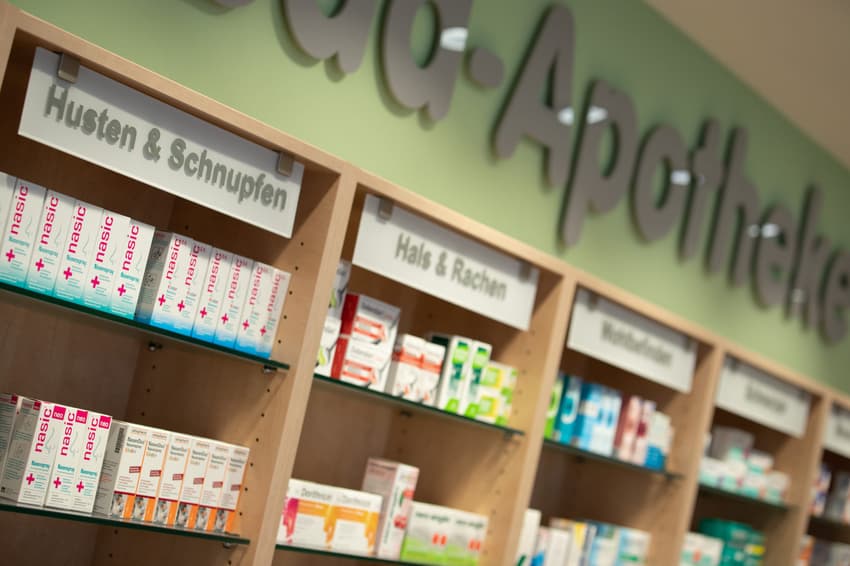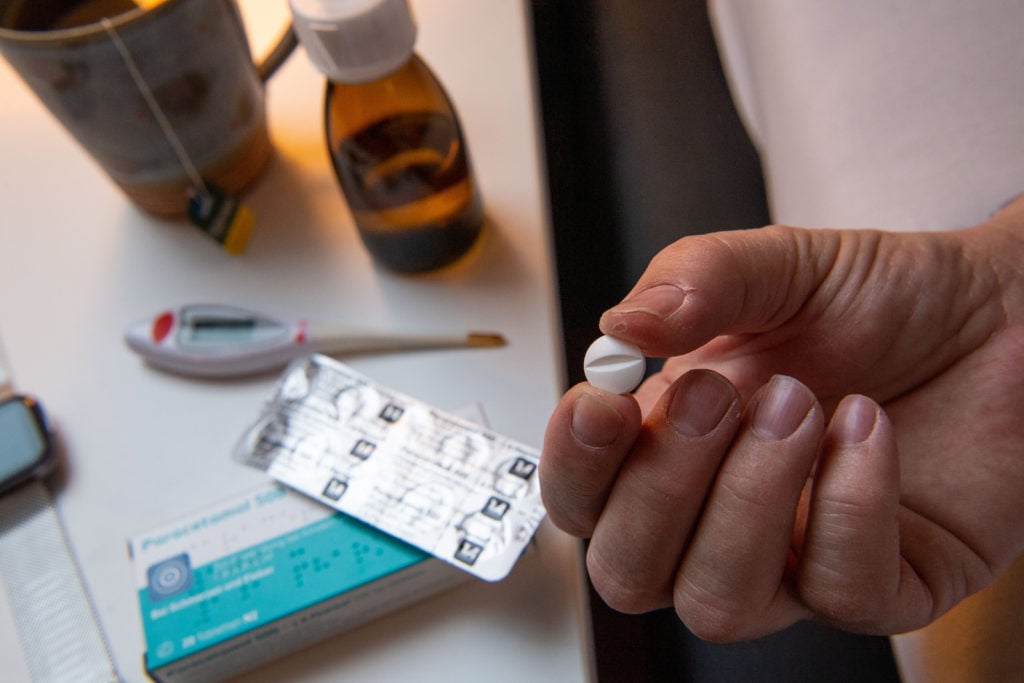Why are medicines in Germany only available in pharmacies?

Over the counter medicines like paracetamol are not usually available to buy in German drugstores or supermarkets. We spoke to an expert to find out why there are strict rules on the sale of some medical products - and why they seem pricier than other countries.
If you’ve ever found yourself scanning the aisles of drugstores like DM or Rossmann wondering where to find the ibuprofen, paracetamol or cough mixture, you will be disappointed - they can generally only be bought in pharmacies in Germany.
It can be a big culture shock to foreigners who are used to picking up some medicines while doing their weekly shop at the supermarket or while buying shampoo at the drugstore.
So why are these over-the-counter medicines only sold in the Apotheke?
We got in touch with the Federal Association of German Pharmacist Associations (ABDA) to find out more.
Christian Splett, a spokesman for the association explained that – with very few exceptions - only pharmacies can sell over-the-counter (OTC) or non-prescription drugs in Germany. He said this is enshrined in German law, and is based on a couple of important principles.
Firstly, there is an emphasis on consumer protection.
“In Germany, we have a high standard of consumer protection which emphasises prevention rather than compensation," said Splett. "We wouldn’t want someone to go and buy a pack of pain killers from a petrol station and then get seriously unwell.
"Healthcare is not like any other business. We have a serious responsibility for people’s health."
Linked to this is the principle that taking medication is not something to be taken lightly.

A man taking a paracetamol tablet. Photo: picture alliance/dpa | Lino Mirgeler
“In Germany, it’s seen as really important that the use of medicinal drugs isn’t trivialised," Splett said. "This is strengthened both by cultural attitudes and by the law."
Since 2004, it has also been possible to buy medications from online pharmacies, from medicine providers such as DocMorris and Shop-Apotheke, which are sometimes cheaper than the high street pharmacies.
These mail-order pharmacies are fully-fledged on-site pharmacies with a mail-order permit under the German Pharmacy Act.
Who decides on the prices of medicines?
On the question of why prices of medications such as cough medicine and standard pain killers seem to be higher in German pharmacies than in other European countries, the answer may lie in the fact that German pharmacies have complete freedom to set their own prices.
READ ALSO: EXPLAINED: How Germany will roll out e-prescriptions this year
“Despite strict regulations and moral obligations, pharmacists still have to act like other business owners, for instance, they set their prices for over-the-counter drugs with regard to the competition,” Splett explained.
According to the website of the Federal Association of German Pharmacist Associations e.V., the prices for individual drugs or for an entire product range can involve calculations based on various business and competitive factors.
For example, the purchasing conditions of a product may vary depending on the manufacturer, wholesaler, order quantity or season. Pharmacies also have to factor in the costs that they incur themselves, such as for personnel or other material costs.
The competitive situation, which is determined by the range and prices of neighbouring pharmacies, can also influence a pharmacy's price calculation.
Meanwhile, there's also the 19 percent value added tax (VAT), which also makes the price higher.
Comments (5)
See Also
If you’ve ever found yourself scanning the aisles of drugstores like DM or Rossmann wondering where to find the ibuprofen, paracetamol or cough mixture, you will be disappointed - they can generally only be bought in pharmacies in Germany.
It can be a big culture shock to foreigners who are used to picking up some medicines while doing their weekly shop at the supermarket or while buying shampoo at the drugstore.
So why are these over-the-counter medicines only sold in the Apotheke?
We got in touch with the Federal Association of German Pharmacist Associations (ABDA) to find out more.
Christian Splett, a spokesman for the association explained that – with very few exceptions - only pharmacies can sell over-the-counter (OTC) or non-prescription drugs in Germany. He said this is enshrined in German law, and is based on a couple of important principles.
Firstly, there is an emphasis on consumer protection.
“In Germany, we have a high standard of consumer protection which emphasises prevention rather than compensation," said Splett. "We wouldn’t want someone to go and buy a pack of pain killers from a petrol station and then get seriously unwell.
"Healthcare is not like any other business. We have a serious responsibility for people’s health."
Linked to this is the principle that taking medication is not something to be taken lightly.

“In Germany, it’s seen as really important that the use of medicinal drugs isn’t trivialised," Splett said. "This is strengthened both by cultural attitudes and by the law."
Since 2004, it has also been possible to buy medications from online pharmacies, from medicine providers such as DocMorris and Shop-Apotheke, which are sometimes cheaper than the high street pharmacies.
These mail-order pharmacies are fully-fledged on-site pharmacies with a mail-order permit under the German Pharmacy Act.
Who decides on the prices of medicines?
On the question of why prices of medications such as cough medicine and standard pain killers seem to be higher in German pharmacies than in other European countries, the answer may lie in the fact that German pharmacies have complete freedom to set their own prices.
READ ALSO: EXPLAINED: How Germany will roll out e-prescriptions this year
“Despite strict regulations and moral obligations, pharmacists still have to act like other business owners, for instance, they set their prices for over-the-counter drugs with regard to the competition,” Splett explained.
According to the website of the Federal Association of German Pharmacist Associations e.V., the prices for individual drugs or for an entire product range can involve calculations based on various business and competitive factors.
For example, the purchasing conditions of a product may vary depending on the manufacturer, wholesaler, order quantity or season. Pharmacies also have to factor in the costs that they incur themselves, such as for personnel or other material costs.
The competitive situation, which is determined by the range and prices of neighbouring pharmacies, can also influence a pharmacy's price calculation.
Meanwhile, there's also the 19 percent value added tax (VAT), which also makes the price higher.
Join the conversation in our comments section below. Share your own views and experience and if you have a question or suggestion for our journalists then email us at [email protected].
Please keep comments civil, constructive and on topic – and make sure to read our terms of use before getting involved.
Please log in here to leave a comment.